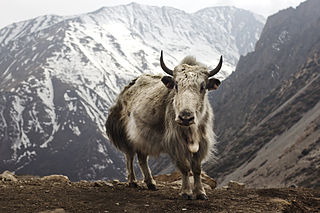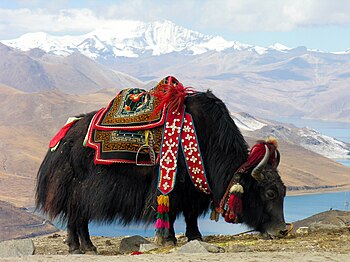Talk:Yak/Archive 1
| This is an archive of past discussions about Yak. Do not edit the contents of this page. If you wish to start a new discussion or revive an old one, please do so on the current talk page. |
| Archive 1 |
Plural of Yak
According to my dictionaries, the plural of yak is yaks, with yak as an acceptable alternative. We need to pick a plural for this article. If nobody jumps in with a compelling argument to the contrary, I'm going to make it "yaks." Gary D Robson 16:50, 30 August 2005 (UTC)
- Since nobody objected, the change has been made. Gary D Robson 22:00, 29 November 2005 (UTC)
Size
Is the domestic yak really only about 1m tall at the shoulders? Apart from the obvious implications for agricultural usefulness, the ones in the photos certainly look much larger. —The preceding unsigned comment was added by 85.8.12.78 (talk) 13:29, 21 April 2007 (UTC).
Secretion?
This line: "They are insulated by dense, close, matted under-hair as well as their shaggy outer hair. [1] This secretion is used in traditional Nepalese medicine and impregnation" Seems to be missing something.
Valid external links?
These do not appear to meet our external link guidelines. I have moved them here until a consensus shows that editors feel that they do meet guidelines. -- The Red Pen of Doom 21:27, 2 October 2008 (UTC)
link farm
- http://www.iucnredlist.org/search/details.php/2892/summ
- ARKive - images and movies of the wild yak (Bos grunniens)
- h2g2 Yaks Edited Guide Entry
- International Yak Association (IYAK)
- European Yak Association (EYAK)
- Article on Yak breeds in FAO archives
- Yaks: The Official Animal of Tibet
- AnimalInfo.Org: Animal Info - Wild Yak
- Vermont Yak Company - videos and more
Please check the lead: sizes
"male yaks stand about 2–2.2 meters tall at the shoulder, the females about one third of that size" - these are quite small females, aren't they? NVO (talk) 14:11, 4 April 2009 (UTC)
- Yes, the sizes are all over the place. The "one third" for the wild females is actually weight, not height. I've corrected this, and given sources. The domestic height given of up to 1.8 m cannot be right. Such an animal would weigh much more than the reffed 580 kg, so I've removed those figures. Richard New Forest (talk) 16:15, 4 April 2009 (UTC)
Wylie transliteration
A friend with some Tibetan experience suggested that the correct Wylie transliteration is "g.yag". I found some references for this:
- http://www.library.gov.bt/IT/wylie.html
- http://places.thlib.org/features#3432
- https://collab.itc.virginia.edu/access/wiki/site/c06fa8cf-c49c-4ebc-007f-482de5382105/tibetan%20historical%20dictionary%20editorial%20manual.html —Preceding unsigned comment added by 216.231.49.179 (talk) 16:19, 29 October 2009 (UTC)
Yak stays an animal
Another IP vandalist vandalized the page and deleted it. SHAME!!! Kingsocarso (talk) 04:03, 14 February 2012 (UTC)
Wild Yak vs Domestic Yak
I think there needs to be two different articles for them. Merging wild and domestic Yak is madness. Just look at how the article starts: "...the Yak is "found" as far north as Mongolia and Russia (which one "is found" - the wild or the domestic)? As I understood, the wild Yak is quiet different in size and behaviour, much like the difference between an aurochs or gaur and a modern domesticated cow. So why the merger? It doesn't make any sense. If I do a search for wild cat I am also not being redirected to domestic cat. 78.94.33.52 (talk) 14:40, 19 May 2012 (UTC)
ICZN Ruling
With all due respect to the authors of the references cited, I believe the ICZN ruling that protected the name Bos mutus had the effect of giving it priority over Bos gruniens when a taxon contains the types of both. That means you can have Bos gruniens and Bos mutus, but only Bos mutus gruniens and Bos mutus mutus rather than Bos gruniens mutus and Bos gruniens gruniens. After all, this is the same ruling that protected Bos primigenus over Bos taurus, so following the logic used here, one would expect Bos taurus and Bos indicus instead of Bos primigenius taurus. The ICZN (commission) doesn't rule, as far as I know, on whether something can be referred to as a species vs. a subspecies, but only which name is correct for that species or that subspecies according to the rules. I'm not a zoologist, so I could be wrong- but I have read the ICZN (code) in its entirety. Chuck Entz (talk) 02:05, 20 October 2012 (UTC)
- Especially note the statement on the bottom of page 83 of the article announcing the decision [1]:
The names listed in the ruling above, which are the first available names in use based on wild populations, apply to wild species and include those for their domestic derivatives if these are not distinguishable.
Yak wool
Anything to add about the wool of yak and the clothing made of yak wool or leather? 112.96.97.10 (talk) 06:26, 1 January 2013 (UTC)
No, yaks are not "usually referred to as Bos grunniens."
Yaks are usually referred to as "yaks". The word Yak usually refers to Bos grunniens, but the sentence in the header would be better off rewritten entirely. Which I might do. 172.5.154.148 (talk) 14:00, 15 August 2013 (UTC)
File:Bos grunniens at Letdar on Annapurna Circuit.jpg to appear as POTD
Hello! This is a note to let the editors of this article know that File:Bos grunniens at Letdar on Annapurna Circuit.jpg will be appearing as picture of the day on February 23, 2014. You can view and edit the POTD blurb at Template:POTD/2014-02-23. If this article needs any attention or maintenance, it would be preferable if that could be done before its appearance on the Main Page. Thanks! — Crisco 1492 (talk) 23:19, 5 February 2014 (UTC)
Yak meat
Is yak meat eaten? If so, the the article should have a section on such use. Mjroots (talk) 21:26, 23 February 2014 (UTC)
File:Bos grunniens at Yundrok Yumtso Lake.jpg to appear as POTD
Hello! This is a note to let the editors of this article know that File:Bos grunniens at Yundrok Yumtso Lake.jpg will be appearing as picture of the day on September 4, 2014. You can view and edit the POTD blurb at Template:POTD/2014-09-04. If this article needs any attention or maintenance, it would be preferable if that could be done before its appearance on the Main Page. Thanks! — Crisco 1492 (talk) 00:43, 16 August 2014 (UTC)


